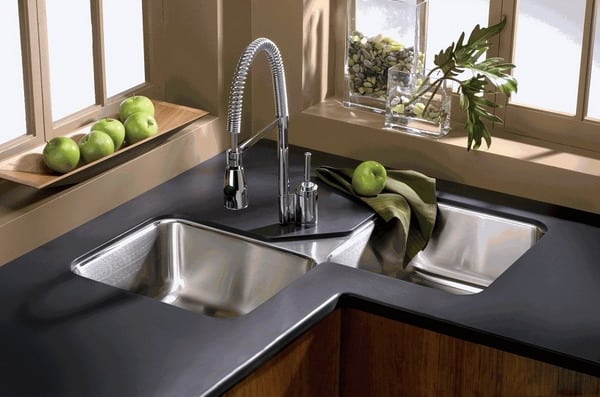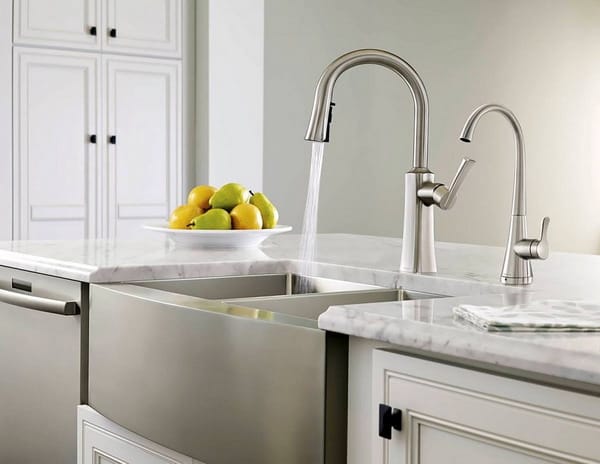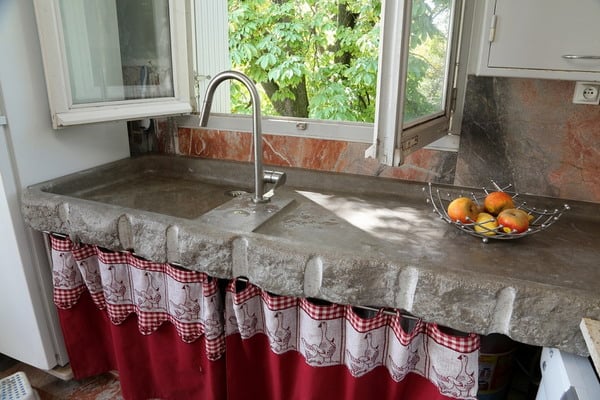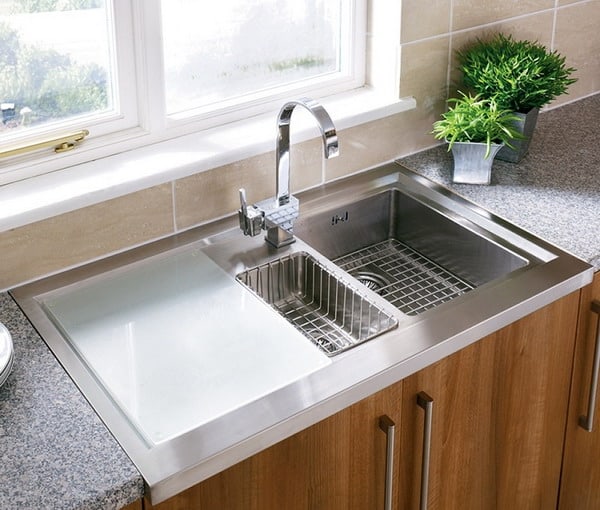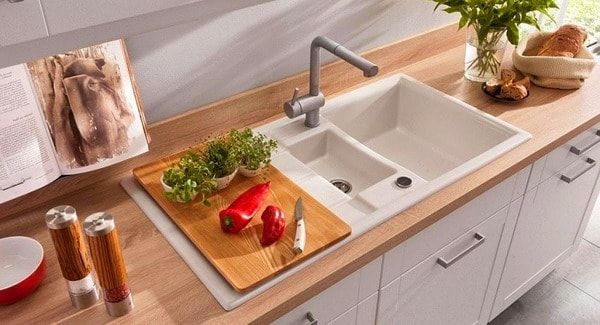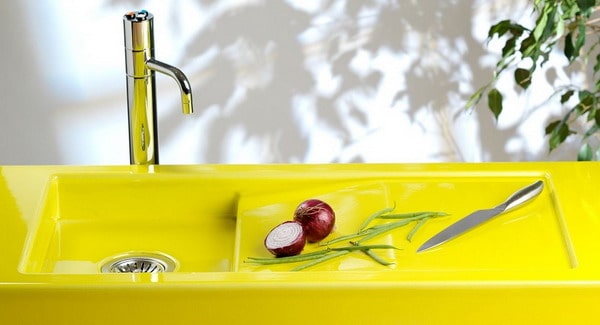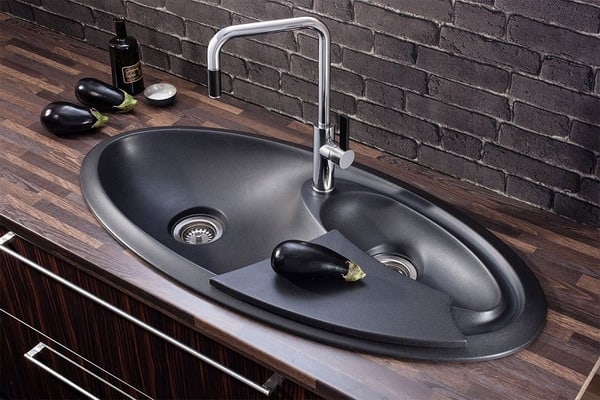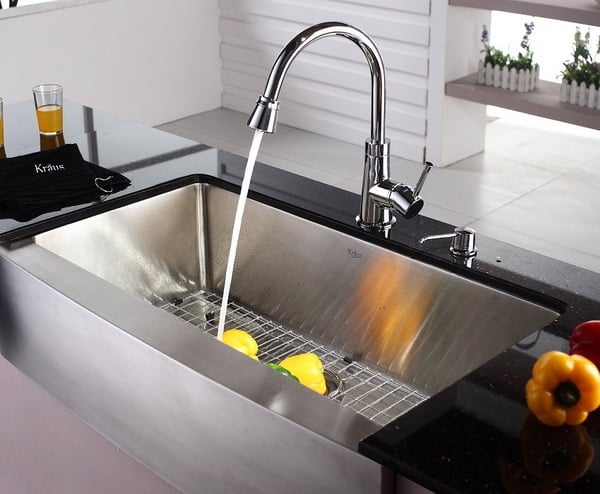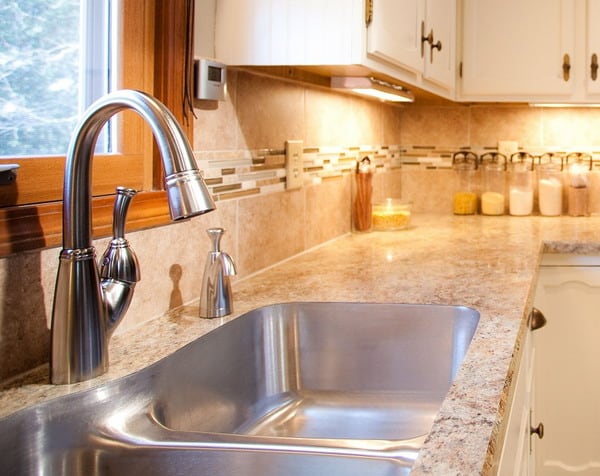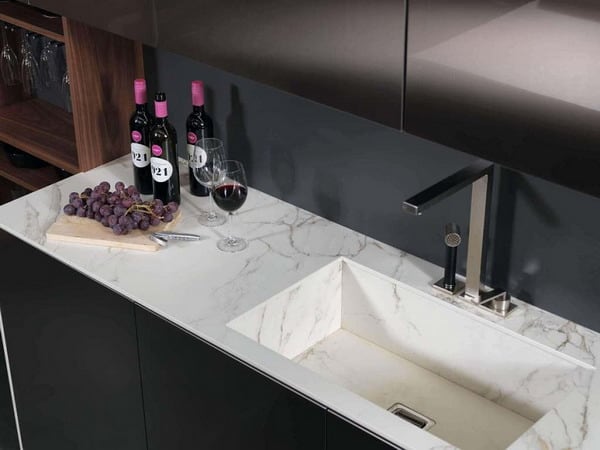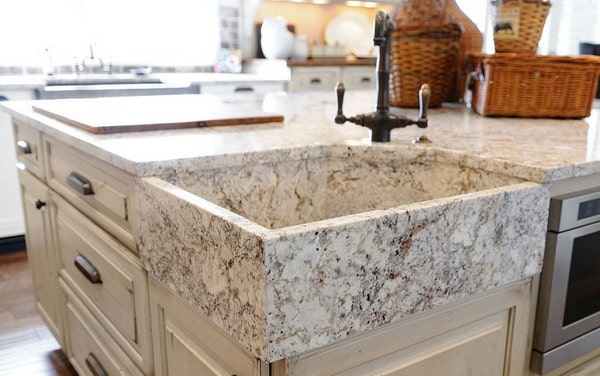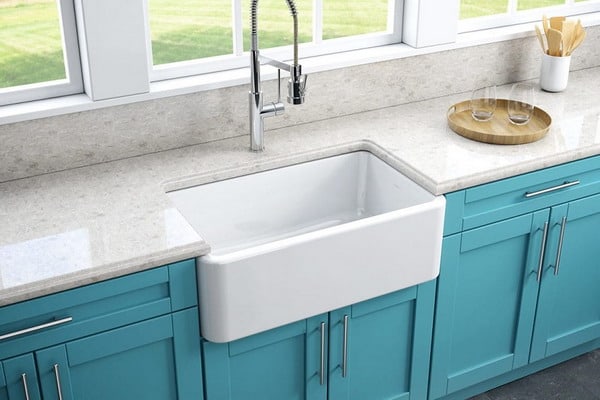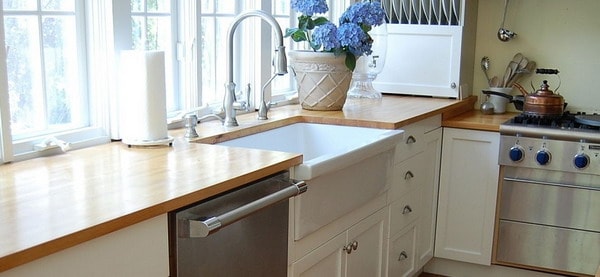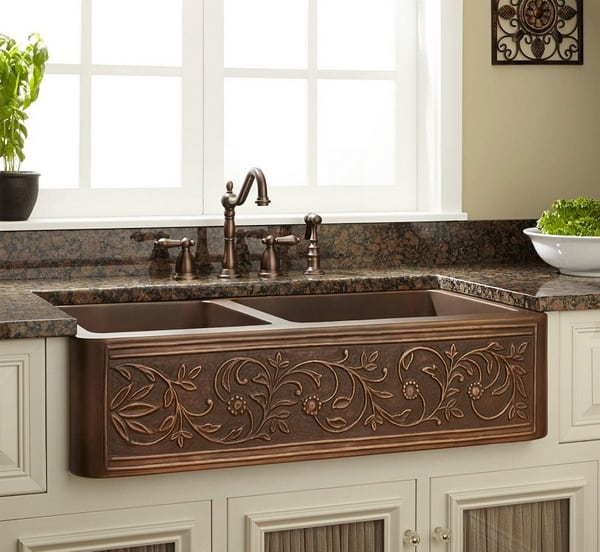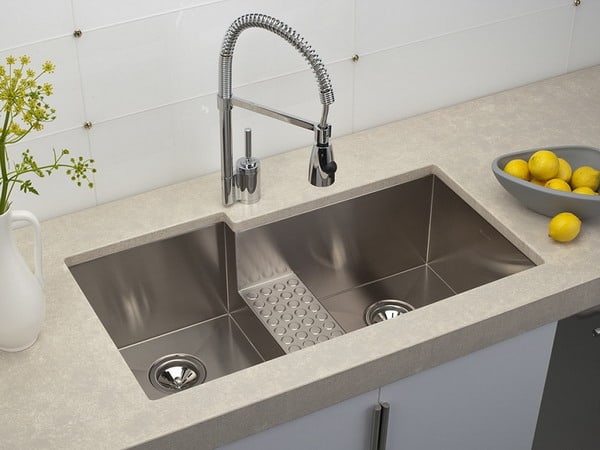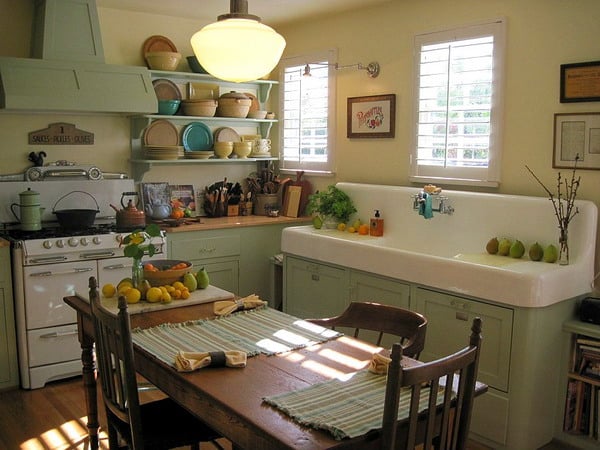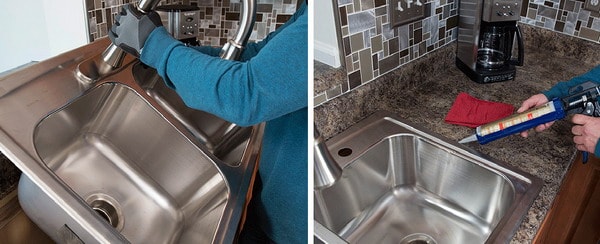The sink is an integral element of the kitchen interior. In order to choose the most suitable sink for a particular kitchen, it is necessary to pay attention to a number of factors, such as: capacity, resistance to mechanical stress (shocks) and other points. A kitchen sink should not only fit into the interior of the room, but also be functional and easy to clean.
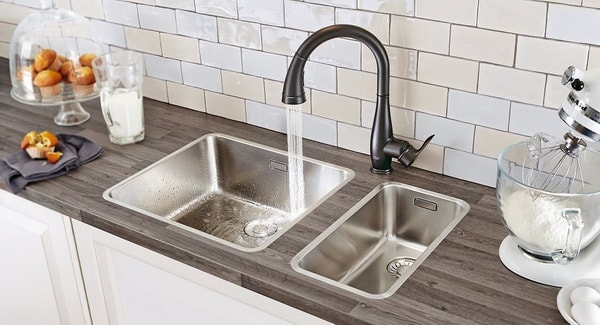
The sink for the kitchen is selected not only for reasons of practicality, but also in accordance with the style of the room.
What are the requirements for a kitchen sink?
The selection of individual elements of the kitchen interior in any case gives rise to a huge number of questions. For example, it is very important not to forget that in many homes the kitchen space is limited. Therefore, the sink should organically fit into the interior and be as functional as possible in a minimum area of space.
There are other requirements that a modern kitchen sink must meet.
Design. First of all, any sink should be matched to the already formed style of the kitchen. Compatibility with the interior of the kitchen is a very important point.
Useful information! It is best to select the sink after the main repair, when the interior of the room is already clearly defined. Photos of sinks in the kitchen, their colors and design can be studied on the Internet.
Spaciousness. This parameter is one of the most important for a kitchen sink. Even if the kitchen is very modest in size, care must be taken to ensure that the sink bowl has sufficient height. Then, without problems, it will be possible to wash not only plates and cups, but also quite voluminous objects (pots, jugs).
Wear resistance. The surface of the sink, which is located in the kitchen, must necessarily be resistant to external influences. A quality sink must withstand high temperatures, and also be resistant to active chemical compounds that are part of detergents. Do not forget about mechanical impacts (shocks, scratches).
The above factors allow us to give an answer to the common question “which sink to choose for the kitchen”, but rather generalized. In addition to the bowl itself, it is necessary to decide on the auxiliary elements that will be required to connect it. Such devices include: siphon, water filter, food waste grinder, etc.
Design features and dimensions of the kitchen sink
The dimensions of the sink for the kitchen are selected depending on the dimensions of a particular room. For a small area of the “food unit” it is recommended to buy compact models of sinks. From a constructive point of view, all sinks are divided into the following types:
- with one bowl. These models are ideal for mounting in confined spaces. They are affordable and are great for standard kitchens in high-rise buildings;
- with double bowl. Models that have two bowls are recommended to be purchased only if the kitchen space allows it. As a rule, both bowls in such a sink are located on the same line. However, another option is also possible, when one bowl is located at an angle to the other;
- half wash. Such models differ in that they have two bowls, one of which (larger) is used directly for washing dishes. The second bowl, smaller, is most often used for washing vegetables and fruits. One and a half sinks can be of two types: mortise and overhead. They are great if there is no possibility of installing two separate bowls;
- corner sink. Mounted as a separate element of the corner kitchen module. It includes one or two bowls, between which there is a working space. The dimensions of the corner sink for the kitchen also allow it to be mounted in small spaces. During the installation of such a model, it is recommended to pay special attention to sealing the joints. This need is due to the fact that corner models are mounted (most often) at the junction of two countertops;
- wing model. The number of wings in such models can be different (1 or 2). The wing is a workspace that is an extension of the countertop.
In addition to the length and width of the sink, a very important geometric indicator is its depth. It affects the capacity of the sink, which, in turn, affects the functionality and usability of this kitchen element.
Useful advice! For standard kitchens in high-rise buildings, experts advise purchasing sinks that have a depth of 15 to 18 cm.
It is not recommended to buy models that have a bowl that is too deep, since it is not very convenient to wash dishes in such sinks. When choosing a sink, you also need to pay attention to its shape. To date, you can find the following varieties of these kitchen elements:
- round;
- rectangular;
- square;
- complex (multifaceted).
So what is the best kitchen sink? Sinks that are rectangular or square are the most popular. This is due to the fact that they go well with kitchen furniture and are a fairly compact solution suitable for standard and small kitchens. Round models have one significant advantage – the largest capacity.
What materials are kitchen sinks made from?
Kitchen sinks can be made from different materials. Its choice is carried out depending on the interior of the kitchen. So, for kitchens, in the design of which the classical concept prevails, sinks made of natural or artificial stone are most suitable. Modern design solutions (for example, high-tech) involve the use of cold shades, so in such cases it is best to use stainless steel sinks.
Stainless steel kitchen sink
Today, stainless steel sinks are the most purchased models. They can be single or double.
The sizes of kitchen sinks made of stainless steel can be very different, as well as their shapes. High-quality stainless models include elements such as nickel and chromium, which make them resistant to aggressive corrosive influences.
Depending on the type of surface, two types of stainless steel sinks are distinguished: glossy and matte. If desired, you can order a model on which a textured pattern will be applied.
Advantages:
- the democratic cost of metal models largely influenced their high popularity. The cost of such sinks is much lower than for analogues made of artificial stone or ceramics. Therefore, it is quite possible to buy a sink for the kitchen inexpensively, if there are no preferences regarding the material;
- universal appearance that is suitable for almost any interior;
- resistance to mechanical stress, active chemicals and high temperatures;
- ease of cleaning;
- long service life.
Disadvantages:
- the need for grounding;
- noise that occurs during the washing of dishes;
- dried water drops are clearly visible on the surface of such a sink.
Note! The level of noise that occurs when using a sink directly depends on the thickness of its walls. To eliminate unpleasant sound, you can purchase and install a special element – a sound absorber.
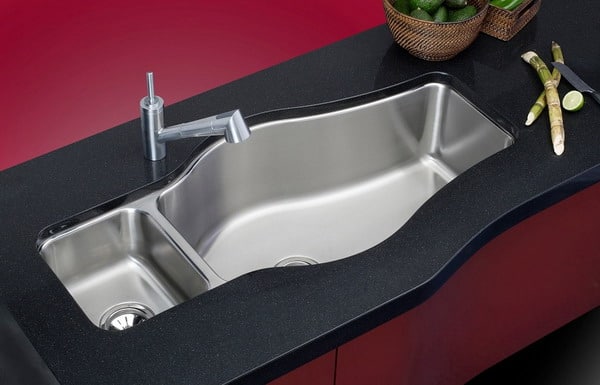
The popularity of mortise stainless sinks is due, first of all, to a large selection of shapes and sizes.
Among budget products of this type, there are often low-quality samples that will not last long. There is a simple way that allows you to determine the quality of a stainless steel sink: you need to draw a magnet along its surface. The smooth sliding of the magnetic element indicates the high quality of the kitchen sink.
Advantages and disadvantages of stainless steel kitchen sinks. material properties. Production technology. Installation method. Construction and accessories.
It is also worth remembering that stainless models often come with a cabinet (cabinet), which will need to be matched in color to the main furniture. Cabinets under the sink in the kitchen are made from chipboard or solid wood. The second option will last longer.
Artificial and natural stone
Kitchen sinks made of artificial stone are more expensive than stainless counterparts. Products from this material have a wide range of surface patterns and are considered an excellent option for a modern kitchen interior style. Such models of shells are made from stone chips and resins, which act as a connecting element. A variety of colors and patterns is achieved through coloring pigments.
Models made of natural stone are located in a higher price segment and are suitable for installation in elite kitchens. They look great paired with granite or marble countertops.
Advantages:
- washing dirty dishes in such sinks is performed silently;
- models made of artificial and natural stone are a real decoration of the kitchen interior;
- ease of care is achieved due to the smooth surface of such sinks;
- dried water drops are invisible on the surface;
- expensive models are able to withstand high temperatures (up to 280 ° C), and cheaper analogues – up to 150 ° C;
- variety of shapes and colors;
- they are hygienic and highly environmentally friendly, as 80% consist of natural or artificial granite chips;
- scratches that occur during the operation of an artificial stone product (without a protective coating) can be eliminated. To do this, you need to sand the damaged area.
Disadvantages:
- rather high cost;
- installation complexity due to high mass;
- surface cleaning is carried out only with mild detergents.
Any coloring agent can leave a mark on such sinks, so it is recommended to immediately remove tea or coffee stains from the surface.
Ceramic or porcelain
Sinks made of ceramic or porcelain are great for kitchens that are made in such styles:
- classic;
- provence;
- country.
Useful advice! Color models of ceramic (and not only) sinks are recommended to be mounted in such a way that they are open to direct sunlight. So their color will seem more saturated.
Advantages:
- have a low noise level during use;
- are scratch resistant;
- are made from environmentally friendly materials and are hygienic;
- resistant to small temperature changes;
- able to tolerate the effects of active chemical compounds, as well as dyes;
- ceramic and porcelain models have a long service life;
- do not change color over time.
Disadvantages:
- high cost (but lower than that of analogues made of artificial stone);
- limited range of colors. Glossy models, for example, are produced only in black or white;
- low impact resistance, which often leads to shell splitting;
- surface cleaning is carried out using only mild detergents.
The weight of ceramic models is quite large. In order to protect the sink from damage during operation, it is recommended to install it on a special cabinet. The choice of a cabinet for a sink in the kitchen is made depending on the interior of the kitchen room and the size of the niche reserved for it. Installing a cabinet with a kitchen sink is a complex process, for which it is best to call a specialist with the necessary knowledge and skills.
Enameled kitchen sinks
Enameled products are easy to clean, but their coating has poor wear resistance and wears off over time. Also, the enamel layer can break off from mechanical stress.
Advantages:
- small mass;
- a large assortment of colors;
- installation of an enameled sink can be done even by a person who does not have special knowledge in this area.
The disadvantages of such a sink are a high level of noise during use and electrical conductivity.
Which sink to buy for the kitchen: tips for choosing
The selection of the number of bowls, shapes and dimensions, as well as the material are the main conditions that allow you to purchase the necessary sink for the kitchen. However, there are other nuances that you need to pay attention to when choosing this kitchen element, namely:
- selection of a faucet that is suitable for a particular kitchen sink;
- choosing a siphon for the sink in the kitchen. When choosing a siphon, you must remember that this device differs in the number of connections. For example, for a double sink, models are mounted that have two drains. An algorithm of actions describing how to install a sink siphon in the kitchen can be easily found on the Internet;
- it is desirable that the spout of the tap matches the depth of the bowl. Taps for kitchen sinks can be of two types, depending on the installation option: wall-mounted and built-in directly into the sink. Most often, the faucet is built into the sink and is located at an angle of 45 ° to the bowl, which is considered a low position. The spout of the faucet should be located in such a way that there are no problems when washing large pots. With a bowl depth of 12 to 16 cm, it is recommended to purchase a mixer with a high spout in the shape of the letter “L” (rounded). If the depth of the sink is 16 cm or more, then you can buy a faucet with a higher spout;
- there are additional devices that are mounted on sinks for different purposes. For example, a waste chopper, which serves to process food waste that has fallen into the drain. It prevents clogging of the sink. Also popular are such auxiliary elements as: shelves for cutlery, built-in trays.
Note! The width of any kitchen sink varies from 40 to 100 cm.
Which sink to choose: single or double?
Sinks that only have one section can come in a variety of shapes. Single-section models are suitable for small-sized kitchens that require careful saving of usable space. If the hostess is used to storing dirty dishes in the sink bowl, it is better to think about purchasing a two-section model. Then it will be possible to put unwashed dishes in one of the sections, and use the second bowl to wash them.
Double models are rightfully considered multifunctional. There are also one and a half options for sinks, which can also be classified as universal.
Today, manufacturers equip single and double sinks with an additional wing, which serves as a stand for wet plates and other dishes. The wing of two-section models of sinks is twice as large as a similar addition to a single sink. Therefore, it is recommended to think carefully before purchasing a double model and perform the necessary calculations.
Double models are perfect if the daily work in the kitchen includes washing a lot of dishes and preparing a large amount of food. Thus, in one bowl you can directly wash the dishes, and in the other – rinse. Another convenience of the two-section model is the ability to rinse your hands in the second bowl while the first one is busy with dirty dishes. Such trifles seem insignificant, but they can greatly simplify the life of any hostess.
The right ways to install a kitchen sink
Depending on the installation option, there are 4 main types of sinks:
- invoices;
- mortise;
- integrated;
- underbench integrated.
The installation method also depends on the type of kitchen. What sinks are chosen for standard kitchens in typical high-rise buildings and small country houses? For kitchens with a small area, overhead or mortise models are best suited. Overhead sinks are mounted on top of a special pedestal.
The dimensions of such a cabinet under the sink in the kitchen can be different, however, most often on sale there are products of standard width and depth. This option of installing a kitchen sink is most suitable for small kitchens. Among the disadvantages of this type of sink, one can single out the fact that water often penetrates into the gap between the cabinet and the countertop. But it does not matter if the sink will stand separately from other furniture.
Useful advice! If you want to buy an inexpensive sink for the kitchen, then it is recommended to choose between an overhead or mortise model.
You can also purchase a sink that is already built (embedded) into the cabinet. You can even buy sinks for the kitchen with a curbstone in the kit even cheaper than in the case of separate purchase of these kitchen elements.
Mortise models of sinks are mounted directly into the countertop. This installation method is the most common today. Mortise samples can also be made from different materials, however, steel is the most common.
Integrated sinks are difficult to install, which requires the use of milling equipment. In any case, you will need to invite a master to install such models of sinks. Another disadvantage of this method is that it requires large financial costs. The main advantage of an integrated sink is reliability.
Underbench integrated models are mounted below the line that corresponds to the surface of the tabletop. The main advantage of such sinks is ease of use, as they do not need careful maintenance.
The choice of sink for the kitchen depends on many factors. There is no one size fits all model. You should take into account the size of the room, its style and layout of all kitchen furniture and appliances in general. And even if your kitchen is unimaginably original and completely unusual, the modern market will be able to offer you a lot of options for your unique project.

